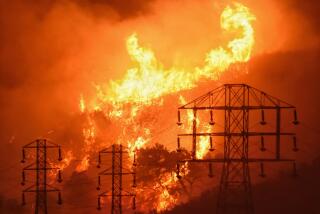U.S. Energy Officials Warn of Much Higher Heating Bills This Winter
WASHINGTON — Winter heating bills could jump as much as 50% and could swell even more if forecasts for colder weather are realized, U.S. energy officials warned Wednesday.
Households using natural gas face the steepest increases in the coming months. They are projected to spend an average of $350 more this winter than last year, a 48% increase, although price hikes will vary around the country. Natural gas expenditures are forecast to go up 34% in the West, where 6 out of 10 households rely on the fuel to heat their homes.
Users of heating oil, which are concentrated in the Northeast, will spend $378 more, for an increase of 32%. Nationally, price hikes for propane are expected to be similar to those for oil, and families who heat with electricity face an increase of $38, or 5%.
Hurricanes Katrina and Rita have boosted prices for oil, natural gas and other energy products, according to a report from the U.S. Energy Information Administration, the Energy Department’s statistics arm, which provided new details of the projected energy toll from the storms.
The prediction sparked fresh anxiety in Congress, where members of both parties have been struggling to respond to skyrocketing energy costs.
The National Oceanic and Atmospheric Administration has predicted that this winter, defined as October through March in the energy world, will be 3.2% colder than last winter and 0.4% colder than the average winter.
“Let’s hope we don’t have a cold winter, because if we do, I think these price projections are going to be low,” said Phil Flynn, a vice president and energy analyst at Alaron Trading Corp. in Chicago.
Rising energy prices have stirred fears of inflation and a negative effect on consumer spending. But most forecasters view the problems as temporary and unlikely to plunge the nation into a recession.
Flynn said the government’s report showed that the hurricane damage was not bad enough to cause an actual shortage of energy.
“There’s no doubt that higher heating bills are going to be a drag on the economy -- and it’s disappointing -- but it could have been a lot worse,” he said.
The prospect of sky-high energy bills this winter has prompted activists in California and elsewhere to demand rate caps for the poor, as well as limits on energy bills for residential ratepayers and small business.
The Bush administration announced Wednesday that it was sending $1.3 billion to states to help low-income families pay heating bills.
The money doesn’t represent new funding: It was expected as part of this year’s appropriation, said Mark Wolfe, executive director of the National Energy Assistance Directors’ Assn. Wolfe said his group would continue to seek an additional $1.3 billion in energy assistance as part of an emergency spending measure expected to come before Congress late this month to fund the Gulf Coast reconstruction.
“Forecasts of a cold winter and high fuel costs mean that the elderly, the disabled and many others will be forced to make painful choices between heating their homes and paying for food, healthcare and rent,” said Sen. Edward M. Kennedy (D-Mass.), urging an increase in energy assistance for the needy.
A bipartisan group of 49 senators, citing “an imminent emergency confronting millions of low-income Americans,” has written Senate appropriators to push for extra money for the low-income program. A bipartisan group of more than 100 House members also is advocating for increased energy assistance.
On Wednesday, an administration official said he expected an increase in energy help for the poor this year, but he stopped short of offering a price tag. “We understand that there’s a need, and we understand that there’s going to be an increase, and we’re working with Congress to find the right number,” said the official, who spoke on the condition that he not be named.
Wolfe said he saw growing interest in Congress for increasing such funding.
“A lot of letters [are] being signed even by members who traditionally never sign on to these letters,” Wolfe said. “For lower-income families, this will truly be a crisis when they get these bills.”
Some Republicans also are citing the high prices to make a new push to relax a long-standing federal ban on new offshore drilling and especially opening an area of the eastern Gulf of Mexico coveted by natural gas producers.
“Until more supplies are brought to market, prices will remain high,” said Rep. Richard W. Pombo (R-Tracy), chairman of the House Resources Committee, who is sponsoring legislation that would allow states to opt out of the drilling moratorium in return for a share of the royalties. “But absolutely nothing will change for American families if Congress continues to stand around, admiring our resources under lock and key.”
As of Tuesday, seven gulf refineries were still shut down as a result of hurricane damage. Their output represented 11% of U.S. refinery capacity, or 1.9 million barrels per day. The hurricanes battered oil and natural gas production platforms in the gulf, and the region’s output of natural gas remains only at about 60% of normal levels.
*
(BEGIN TEXT OF INFOBOX)
Keeping warm
Here’s how Californians heated their homes in 2004.
Percentage of total households that used each source of heating energy
Natural gas: 73.1%
Electricity: 21.6%
Wood: 2.2%
Heating oil: 0.5%
Other: 0.3%
No fuel used: 2.3
Source: U.S. Census Bureau’s 2004 Community Survey
More to Read
Sign up for Essential California
The most important California stories and recommendations in your inbox every morning.
You may occasionally receive promotional content from the Los Angeles Times.









